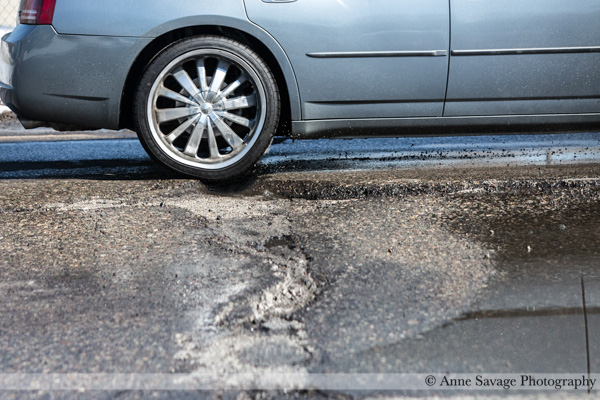The following guest post is by Sue Browne, Regional Programs Manager for the BlueGreen Alliance in Michigan.

Photo by Anne C. Savage, special to Eclectablog.
It’s hard to believe that last year’s bad weather cost taxpayers like you and I around $277 million in damages across the state—a $67 million increase from the year before. Had our infrastructure been better prepared in the first place, this money could have been spent elsewhere in many different ways.
Of course we can’t prevent dangerous weather from happening, but we can do more to prevent the electric grid, wastewater treatment systems and more from breaking down on us as easily the next time around.
The link between the state of our infrastructure and severe weather is clear. Today extreme temperature swings are causing pot-hole ridden roads to be even worse and even a few extra inches of rain and gale force winds are causing some dams and levees to leave homes and schools more—not less—vulnerable to flooding. More and denser snow pack thawing last spring caused widespread flooding in the Upper Peninsula. Sixteen counties were declared major disaster areas, costing a cool few million dollars in damage from just one storm. The bills add up pretty quickly over the year.
To put it in perspective, the amount of money spent on repairing damages last year is around 84 percent (pdf) of the entire budget of the Michigan Department of Education’s spending for 2015.
If the growing amount of money—in the hundreds of millions of dollars—we’re spending to clean up communities isn’t enough to tell you there’s a problem, the American Society of Civil Engineers’ “D” grade for Michigan’s infrastructure is proof we’re really not making the grade. We can’t afford to let these priorities take a back seat any longer.
The breaking, crumbling, cracking and inefficiencies of the systems we rely on everyday—to get us back and forth to work, power homes and schools, keep us safe from floods, make sure we can call the police and fire during emergencies, and more—are a problem and a rare opportunity to create jobs and better protect us all.
In my work for the BlueGreen Alliance, I talk to people everyday who understand the need for us to Repair America’s infrastructure. Also, there’s no shortage of people who have the know-how to fix these problems and who also see the issue of infrastructure screaming out for our attention.
These are the jobs (pdf) that can put construction laborers, equipment operators, and maintenance workers into positions right away. Indirectly, industries that service those sectors and supply chain, including the manufacturing of materials, components, and equipment would also see economic benefits. Communities would benefit overall through increased demand for goods and services such as retail, housing, and financial services.
Overall, investments to repair infrastructure in Michigan could create or sustain more than 119,300 jobs each year throughout the economy.
It’s time to put some ideas to work for Michigan that will help us protect ourselves, produce good jobs and prosper for a long time to come. Worse weather is in the forecast and we must do more to prepare for it. How can we lose when creating jobs and economic growth, reducing post-storm clean up costs and having the peace of mind that we can better weather the next storm or tornado are all the priceless payoffs of making these investments?
Help us to raise public awareness about the importance of the systems we rely on every day in order to make something happen. There are three things that you can do now. Also, find out more information HERE.
- Click HERE to share your story.
- Copy, paste and Tweet the following along with a photo of infrastructure that needs to be repaired in your own community:
Our infrastructure is falling apart. Let’s #RepairAmerica and create good jobs & healthy communities. - Click HERE and post your photo on our Facebook wall (and like us there if you don’t already).



